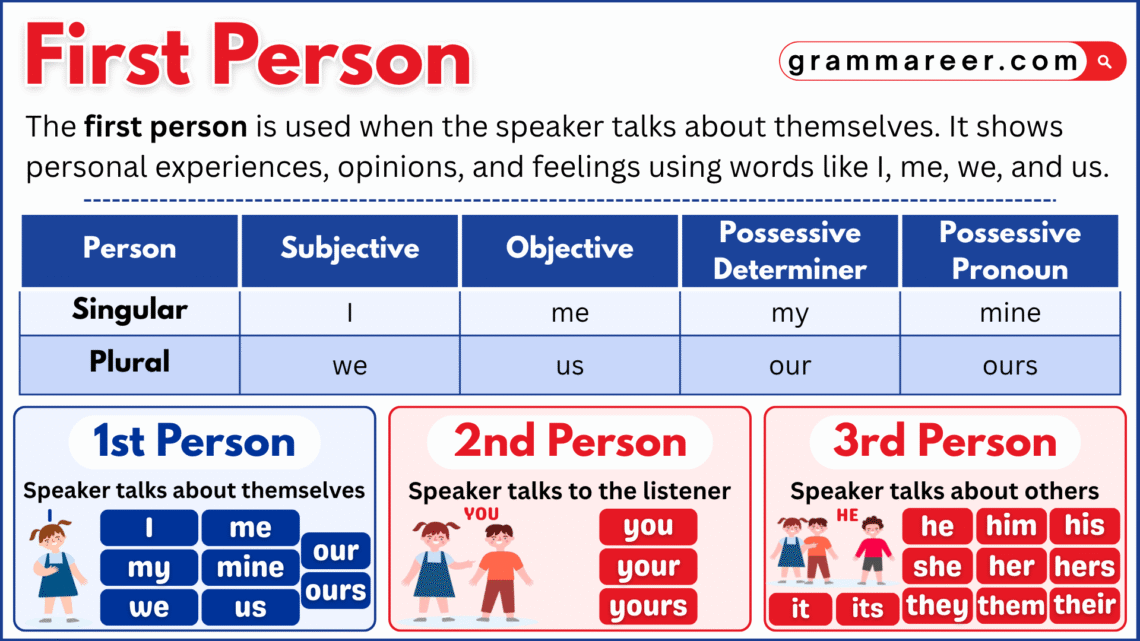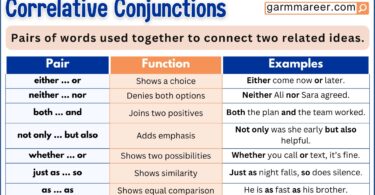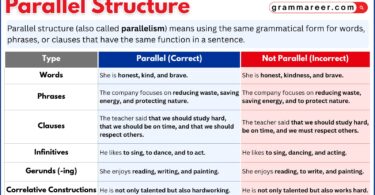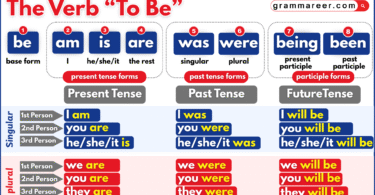Imagine you’re telling a story about your own life — what you saw, felt, or did. You might say, I woke up early today, or I couldn’t stop laughing at the joke. That’s writing in the first person point of view. It’s like letting your readers see the world through your eyes. When you use words like I, me, and my, you make your writing sound personal and real like as if you’re talking directly to the reader.
Table of Contents
What Is First Person?
When we talk or write about our own thoughts, feelings, or experiences, we’re using the first person. It simply means we’re speaking from our own point of view.
In writing, the first person is often used when the narrator is telling their own story.
For example:
- I opened the door and saw a bright light.
Here, the word I shows that the person telling the story is also the one who experienced it. Writers use the first person to make their stories feel more personal and real — as if the reader is seeing the world through the narrator’s eyes.
And it’s not just for stories! We use the first person every day when we say things like I’m going to the market or I watched a movie last night. Anytime you talk about yourself, you’re using the first person.
What is a first-person pronoun?
A first-person pronoun is the word we use when we talk about ourselves. It shows that the speaker or writer is part of the action. For example, when we say I am happy or We are learning English, the words I and we are first-person pronouns because they point to the person speaking or writing.
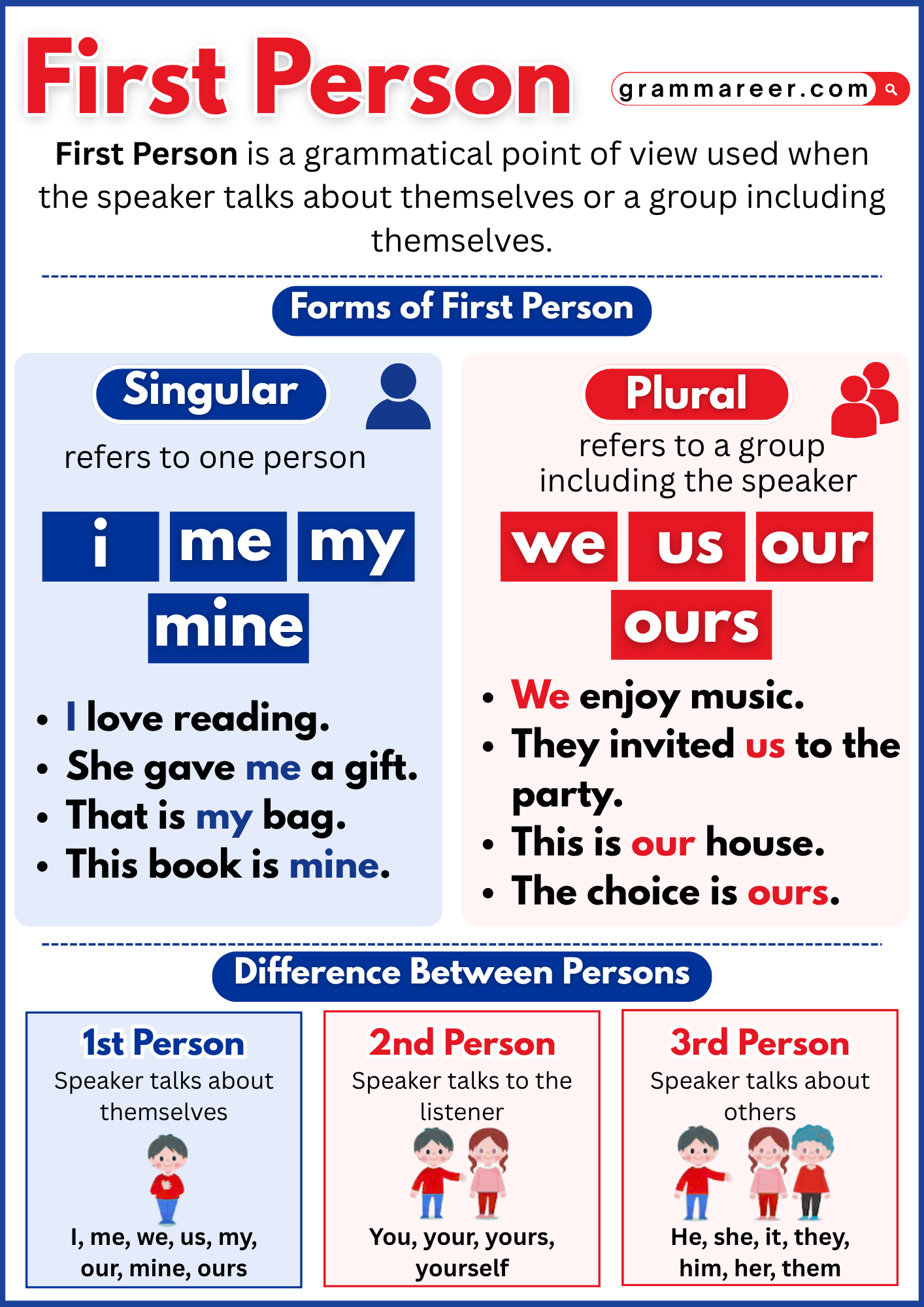
List of first-person pronouns
The most commonly used first-person pronouns are:
| Pronoun | Usage | Example |
|---|---|---|
| I | Used by a single person to talk about themselves (subject form) | • I love learning new things every day. |
| Me | Used when the speaker is the object of a verb or preposition | • She helped me with my homework. |
| We | Used by a group that includes the speaker (subject form) | • We are planning a trip this weekend. |
| Us | Used when the speaker and others are the object of a verb or preposition | • The teacher gave us extra time for the test. |
| Mine | Shows ownership or possession (used alone, not before a noun) | •This book is mine, not yours. |
| Ours | Shows shared ownership or possession (used alone) | • The victory was ours after all our hard work. |
| Myself | Used for emphasis or when the speaker does something to themselves | • I made this cake all by myself. |
| Ourselves | Used for emphasis or when the group does something to themselves | • We enjoyed the picnic and cleaned up by ourselves. |
When and Why to Use First-Person Pronouns
We often use words like I, me, or we when we talk or write — but have you ever wondered why they’re so common? Let’s talk about when it’s best to use them and what makes them sound natural.
Talking About self Naturally:
When we share our own experiences, using I or we is the easiest and most natural way to do it.
For example:
| Incorrect ❌ | Correct✅ |
| • Ema went to London last month. | • I went to London last month. |
when you are Ali! It would sound strange — like you’re talking about someone else. That’s why we use the first person when we’re sharing personal experiences — it keeps the sentence smooth and clear.
Making Our Message Feel Friendly:
When you use we, we make our writing or speech sound more personal and connected. It feels like we’re including the listener or reader in what we’re saying.
For example:
| Incorrect ❌ | Correct✅ |
| • People should save water. | • We should save water. |
The second one sounds more caring — like we’re all in this together. Using we helps your message feel warm and relatable.
Writing That Feels Real and Engaging:
In stories, diaries, or essays, using I helps readers see things from our eyes. It lets them experience what we’re feeling and thinking.
For Example:
- I opened the old door, and my hands started shaking.
This pulls the reader into your world — they can almost feel what you’re feeling. That’s the power of the first person in storytelling.
First Person Singular and Plural
Here’s how we use first-person pronouns in different forms: the subjective, objective, and possessive cases.
| Form | Singular | Example | Plural | Example |
|---|---|---|---|---|
| Subjective | I | • I love reading. | We | • We enjoy music. |
| Objective | Me | • She called me. | Us | • They helped us. |
| Possessive Determiner | My | • This is my notebook. | Our | • That’s our car. |
| Possessive Pronoun | Mine | • This book is mine. | Ours | • The house is ours. |
Difference Between First, Second, and Third Person Pronouns
In English, we use three main points of view: first person, second person, and third person. Each one depends on who is speaking and who is being talked about.
| Person | Used For | Pronouns | Example Sentences |
|---|---|---|---|
| First Person | When the speaker talks about themselves | I, me, we, us, my, our, mine, ours | • I am learning English.We love reading. |
| Second Person | When the speaker talks directly to the listener | you, your, yours, yourself | • You are a great singer.This book is yours. |
| Third Person | When the speaker talks about someone or something else | he, she, it, they, him, her, them, his, hers, theirs | • He plays football.They are going to school. |
Examples of First Person Pronouns
- I love reading storybooks before bed.
- They invited us to their birthday party.
- That blue bag is mine.
- We went to the park yesterday.
- He gave me a chocolate.
- Our dog is very playful.
- I am learning how to cook.
- This garden is ours.
- Can you help us with the project?
- My friends always support me.
Why the First Person Is Improtant?
The first person point of view is important because it makes our writing sound more personal and real. When we use words like I or we, we build a direct connection with our readers or listeners. In everyday writing or business messages, using the first person shows honesty and responsibility because it feels more human and friendly. In storytelling, it helps readers step into the narrator’s world and experience their emotions and thoughts up close. Simply put, writing in the first person makes our message more natural, relatable, and engaging for our audience.
FAQs about the First Person
First-person pronouns are words we use when talking about ourselves or a group we’re part of. These include I, me, my, mine, we, us, our, and ours.
We use them to share our thoughts, actions, or feelings directly. For example, I am learning English, or We are going to the park. They make our speech and writing sound more natural and personal.
I love reading books.
The teacher gave me a star.
This is my notebook.
The notebook is mine.
We finished our homework.
The victory is ours.
You May Also Like

